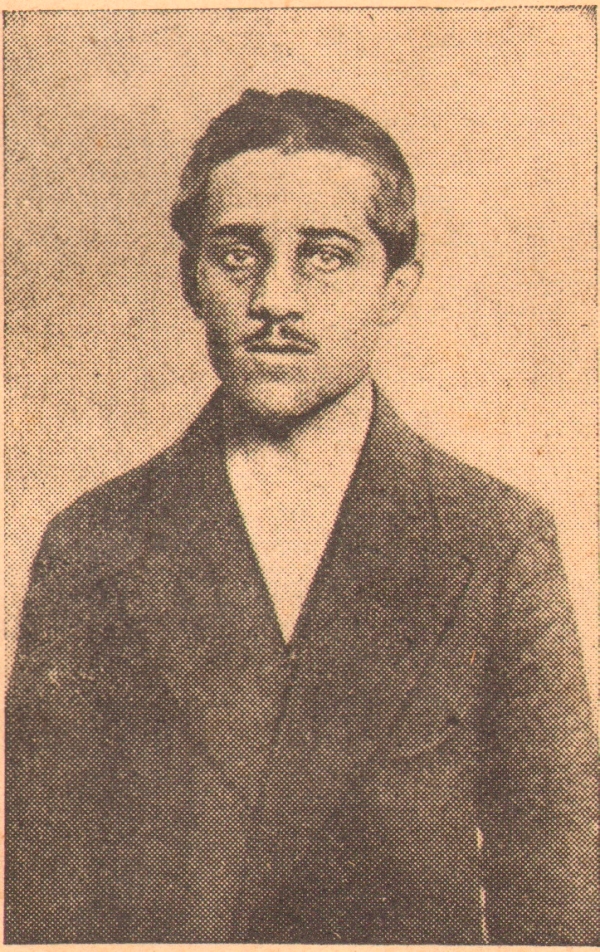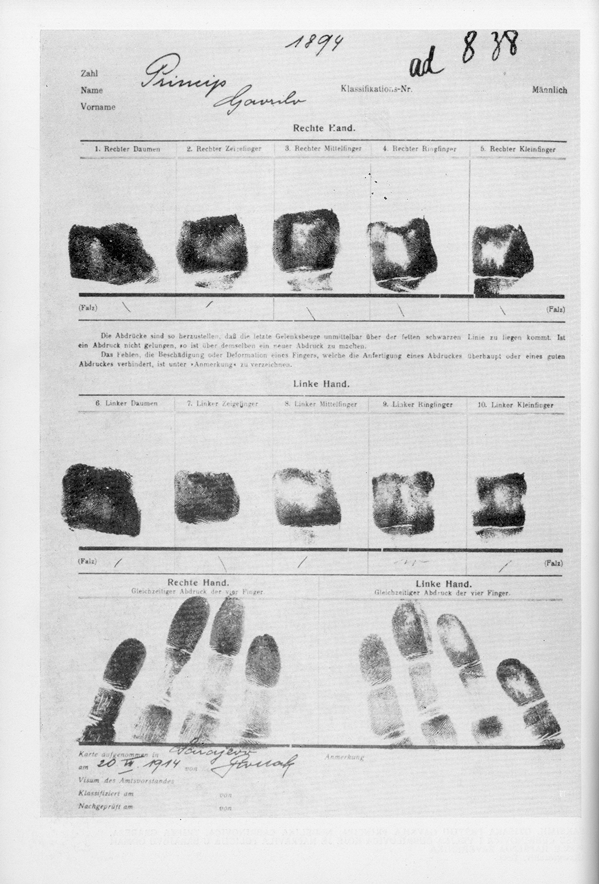The memory of World War I, its events and consequences, its victims and victors, remains very much alive today. It has become part of the individual and collective memory of Europe and of countries across the world – the stories of soldiers and their families continue to be told and published from generation to generation.
To mark the centenary of its outbreak in 2014, a consortium of national libraries and other partners from eight European countries that found themselves on different sides of the historic conflict will make an unparalleled collection of more than 400,000 digitised items relating to World War I freely available to the public for the first time through the Europeana online portal.
As part of the Europeana 1914-1918 project, the consortium members will be adding a new blog post every month that looks at some of the stories behind just a few of these 400,000 images.
This month, our colleagues at the National Library of Serbia have uncovered an incredible record of what happened to Gavrilo Princip, who was part of the group who took part in the assassination of Archduke Franz Ferdinand of Austria on 28 June 1914, which began the chain of events that led to the outbreak of World War I.
Gavrilo Princip: on Himself:
The notes we present in this blog show lesser known details of Gavrilo Princip’s life.
After the assassination of Archduke Franz Ferdinand in Sarajevo, Gavrilo Princip was put on trial with the other assassins. He was sentenced on 28 October 1914 to twenty years in prison, and was transferred to the military prison in Terezin on 2December 1914.
Here, he was visited several times by Dr Martin Pappenheim. Pappenheim recorded his talks with Princip, which give new perspectives on our understanding of his personality.


Princip's fingerprints
These short, stilted notes were made in the period between February and June 1916, and cover Princip’s life story, the assassination, and his political and social ideals.
They were translated from the original German by Dragan Purešić.
Princip Gavrilo, 19 February 1916, Prison. From 5 December 1914, held here. Held in solitary confinement all of the time. Three days ago, his shackles were removed. Father is a peasant, and is also in business. Father is a calm man, doesn’t drink; lives in Grahovo, Bosnia. No illness in the family. Princip did five grades of school in Sarajevo, then three grades in Belgrade, but did not sit the final examination. Was always healthy. Had no serious injuries until assassination. No bedwetting. At school he walked in his sleep. Only lasted for one year. Never lost consciousness. Always an excellent pupil up to fifth grade. Fell in love. Began to understand ideals, etc. Left school in Sarajevo in 1911. Then took part in nationalist demonstrations against [Prime Minister of Hungary] Tisza. Was among pupils at the front of the demonstrations. Was treated badly by his professors. Began to read a lot of anarchist, socialist, and nationalist pamphlets, as well as fiction Bought books himself; didn’t talk of these things: his Father was not interested in political matters. He was seldom with other pupils, and was always alone. Always a still, sentimental, serious child. As a child, not especially religious. The year 1911 was critical. He went to Belgrade alone, telling no one. Father and brother refused to send money; it was agreed he should stay in Belgrade. Father is 54, Mother is 45. He has two brothers: one 26, one 18. Six more died as children before the age of 10. He is the fourth child. Brothers are a school pupil and a merchant. Brothers are quite ordinary men. His love for the girl remained, yet he never wrote to her. Said he met her in fourth grade; never kissed his love; and talked of it no more. Studied as private pupil. Had no friends; alone, always in libraries. He wanted to go to fight in the Balkan War, but considered too weak. Spent several months each year at his brother’s house near Sarajevo. Passed eighth grade examination, but only in May 1914. After the assassination, he had injuries on his head and back. He took potassium cyanide, but was weak, and vomited. In solitary confinement: conditions are very bad. He is without books, has nothing to read, and allowed no communication. He is used to constant reading, and misses it most in prison. Sleeps at night for four hours at most. Dreams a lot. Says he has beautiful dreams of life, of love: says nothing horrible. He thinks about everything, especially of the circumstances in his Fatherland. He has heard something about the War. He has heard ‘a tragic thing’, that Serbia is no more. His life is hard, Serbia is no more, says his people will have a rough time. Says that World War was inevitable, and didn’t depend on that [assassination]. He was an idealistic man, and wanted to avenge his people. His motives were revenge and love. All of his youth he was in a revolutionary mood. Talks of the anarchist pamphlets that led him to assassination. He thinks differently today; he thinks social revolution is possible throughout Europe, that things change. He doesn’t want to talk about it in front of the warden. He is not ill-treated- everyone behaves correctly. A month ago admitted to trying to commit suicide, he wanted to hang himself with a towel. It was stupid to have hope. He has a wound on the chest and arm. Says that ‘a life like mine is impossible’. Around noon, he could not eat, was in a bad mood, and suddenly had the idea to hang himself. Says he would do it, if he had a chance. He thinks of his parents and family- but hears nothing about them. Misses them dearly.
Гаврило Принцип о себи
Белешке које представљамо приказују мање познате детаље о животу Гаврила Принципа. Настале су у време када је Велики рат беснео свом жестином. Папенхајм је забележио разговоре које је водио са Принципом, чиме је дата нова перспектива у поимању његове личности. Након атентата на надвојводу Франца Фердинанда, Гаврилу Принципу је суђено у Сарајеву заједно са осталим атентаторима и, осуђен 28. Х 1914. године, пребачен је 2. ХII 1914. године у војни затвор у Терезину, где га неколико пута посећује доктор Мартин Папенхајм. Гаврило Принцип умире од туберкулозе 28. IV 1918. године. Стенографске биљешке доцента дра. Мартина Папенхајма о чешћим разговорима са Гаврилом Принципом у времену од фебруара до јуна 1916. : О хисторији његовог живота, о атентату и о његовим политичким и социјалним идејама.
_Принцип Гаврило 19. II 1916. – Казнени завод ** O**д 5. XII 1914. овдје. Читаво вријеме сам у ћелији. Прије три дана скинути окови. Отац сељак, бави се и подузећима. Отац миран човјек, не пије. Отац живи у Грахову, у Босни. Нема болести у фамилији. Пет разреда школе (свршио) у Сарајеву, затим три разреда у Београду, без матуре. Увијек био здрав. Не зна ништа о тешким повредама до атентата. Тада повреде на глави и свуда, онда пао у несвијест. Шарлах. Није имао Enuresis nocturna. Као гимназиста ноћу тумарао. У соби се шетао. Само за једне године. Пробудих се. У трећем разреду. Никада нисам имао нападе несвјестице. Увијек одличан ђак до петога разреда. Заљубих се. Почео је да схвата идеале, итд. Напустио школу у Сарајеву 1911. Онда су биле националистичке демонстрације против Тисе. Био је у првом реду ученика. Професори се рђаво понашали према њему.Читао многе анархистичке, социјалистичке и националистичке списе, белетристику и све. Сам књиге куповао; о овим стварима није говорио. Оца није забављао политичким стварима. Ријеткоје био са другим ученицима; увијек сам. Био је увијек миран, сентиментално дијете. Увијек озбилјан, с књигама, са сликама, итд. Ни као дијете није био нарочито побожан. Означује годину 1911. као критичну. Сам је пошао у Београд, ником није о том говорио, отац и брат нису хтели да мушаљу новаца. Обећао је да ће бити добар ученик. Тада су се сагласили да остане у Београду. Отац 54 године, мајка 45. Још два брата. Један од 26, а други од 18 година. Још шестеро умрло, као мала дјеца до десет година, он је четврто дијете. Браћа су ученик реалке и трговац. Браћа посве обични људи. Љубав према дјевојци није ишчезла, али јој никада није писао. Прича се да ју је упознао у четвртом разреду; идеална љубав. Није је ни пољубио; осим тога неће ништа више о томе да каже. Студираше као приватни ђак. Ни с ким се није дружио, усамљен, увијек у библиотекама. Хтио је у Балкански рат, али су пронашли да је слаб. По неколико мјесеци сваке године био је код брата код Сарајева. Тек у мају 1914. положио испит осмога разреда. Приликом атентата озледе на глави, леђима и свуда. Узео је цианкалиј, али је био слаб па је повратио. У самици врло рђаво, без књига, ништа нема да чита, ни с ким се није дружио. Навикао је да увијек чита. Највише пати због тога што нема нешто да чита. Највише пати због тога што нема нешто да чита. Спава ноћу највише по четири сата. Увијек санја. Лијепи снови. О животу, о лјубави, ништа што би застрашивало. Мисли о свему, нарочито о приликама у Отаџбини. О рату је нешто чуо. Једну трагичну ствар је чуо : Србија више не постоји. Његов је живот уопште тежак, Србија не постоји, са мојим народом бит ће рђаво. Није се могао избјећи свјетски рат, од тога он није зависио (мисли на атентат пр. прев.) Био је идеалан човјек. Хтио је да освети свој народ. Мотиви: освета и љубав. Цијелу младост у таквом револуционарном расположењу. Говори о анархистичким списима који су га побуђивали на атентат. Данас мисли другачије. Мисли да је у читавој Европи могућа социјална револуција, пошто се ствари измјењују. Неће више да о томе говори пред профусом ( старешина казнионе, пр. прев.) . Не поступа се сњиме рђаво. Сви су с њим коректни. Признаје да је прије мјесец дана покушао самоубијство, хтио се објесити о пешкир. Живот је тежак. Нема наде.Била би лудост да се нада. Има рану на прсима и на мишици. (fungus). Живот као што је мој јесте немогућ. Тада око дванаест сати не могаше да једе, био је рђаво расположен, наједанпут идеја да се објеси. Да је имао прилику, то би учинио. Мисли на родитеље и на све, ништа не чује за њих, признаје да чезне. То (чежња, пр. прев.) постоји код свакога.
